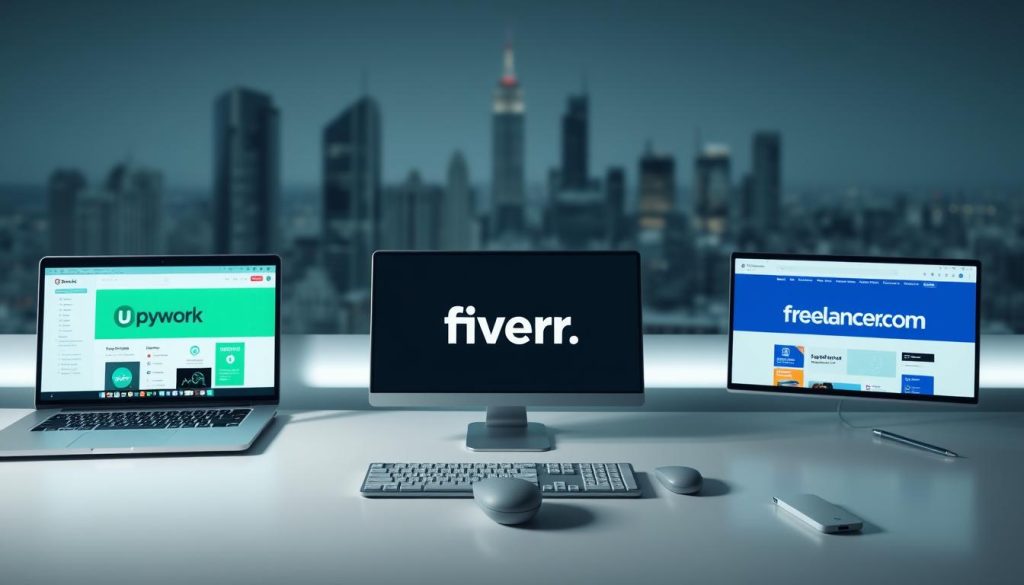Remember that moment when you first dreamed of professional freedom? The excitement of choosing projects that ignite your passion, coupled with the quiet anxiety of « Will this actually work? » You’re not alone. Over 1 million self-employed professionals in France have transformed that uncertainty into thriving careers – and you can too.
Creative and technical fields now drive unprecedented demand for specialized skills. Graphic design roles grew 23% last year, while content creation and software development dominate 41% of opportunities. This shift isn’t temporary – it’s a fundamental change in how businesses access top-tier talent while professionals reclaim control over their work.
Our guidance helps you navigate this evolving landscape with confidence. Whether you’re transitioning from traditional employment or scaling existing operations, understanding market dynamics proves crucial. We’ll show you how to identify high-demand niches and build client relationships that withstand economic fluctuations.
Discover how effective marketing strategies can transform your workflow. Many independent professionals reclaim 20+ hours monthly by optimizing their outreach – time better spent on billable projects or skill development.
Table of Contents
Key Takeaways
- France’s self-employed workforce exceeds 1 million professionals across booming industries
- Technical and creative fields show 23-41% annual growth in available opportunities
- Modern work culture increasingly favors flexible talent over traditional employment models
- Strategic positioning helps specialists command premium rates in competitive markets
- Client relationship building remains critical for long-term career sustainability
Embracing the New Era of Freelancing
Modern professionals are rewriting career rules. A 2023 study reveals 68% of French workers prioritize purpose over paychecks when choosing projects. This mindset shift fuels a cultural revolution where autonomy and sustainability drive career decisions.
Understanding the Shift in Work Culture
Traditional office structures struggle to meet evolving expectations. Workers now demand:
| Traditional Priorities | Modern Expectations | Business Impact |
|---|---|---|
| Stable salaries | Flexible income streams | Lower fixed costs |
| Job security | Portfolio diversity | Access to niche skills |
| Corporate benefits | Ecological alignment | Enhanced brand reputation |
Companies increasingly partner with specialists for specific projects rather than maintaining full-time staff. This approach lets businesses adapt quickly while professionals enjoy varied, meaningful work.
Capitalizing on Global and Local Trends
Three forces shape today’s opportunities:
- Purpose-driven demand: 42% of French clients prefer eco-conscious partners
- Tech-enabled collaboration: Remote tools erase geographical barriers
- Specialization premium: Niche experts command 30% higher rates
Research shows professionals who align services with sustainability goals secure 22% more repeat business. This strategic positioning helps build lasting client relationships in our changing economy.
Understanding the French Freelance Scene

France’s professional landscape now thrives on tailored connections between skilled specialists and organizations. Over 40% of companies report using localized platforms to find exactly the expertise they need. This shift creates exciting possibilities for those ready to navigate its unique rhythms.
Insights on Market Trends in France
Three factors define success here:
- Cultural alignment matters more than global averages
- Regional hubs like Lyon and Toulouse drive 68% of opportunities
- Environmental consciousness influences 53% of project selections
Platforms like Malt verify talent qualifications rigorously, while Comet highlights eco-friendly projects. This curated approach helps business leaders connect with professionals who share their operational values.
Platforms Tailored for the French Market
Leading portals prioritize quality through:
- Payment protection systems meeting French labor standards
- City-specific filters matching economic hotspots
- Transparent client reviews translated into local dialects
Our curated list of platforms simplifies finding mission-based contracts that respect French work culture. Combine these tools with personal referrals – still responsible for 57% of project wins – to build lasting momentum.
Optimizing your profiles for regional preferences proves essential. Clients here value concise proposals that demonstrate understanding of both technical requirements and cultural subtleties.
Navigating the Freelance Job Market
Effective navigation through today’s opportunity-rich landscape requires strategic filters and trusted tools. Specialists often spend 40% of their work week searching for quality engagements – time better spent delivering exceptional results. Our approach helps you focus on platforms and methods that align with your expertise and professional values.
Key Strategies for Finding Opportunities
Top-performing professionals use curated platforms as their primary search mechanism. Consider these critical features when selecting your work hubs:
| Platform Type | Screening Process | Payment Security | Specialization Focus |
|---|---|---|---|
| Premium Networks | 3% acceptance rate | Escrow systems | Tech & Leadership |
| General Marketplaces | Open registration | Dispute resolution | Multiple industries |
| Localized Boards | Cultural verification | Regional compliance | Eco-conscious projects |
Platforms like Toptal demonstrate how rigorous vetting creates high-value environments. Their 3% acceptance rate ensures clients encounter only top-tier talent, while Upwork’s escrow system resolves 68% of payment concerns upfront.
Expert Advice on Client Management
Successful relationships begin with clear expectations. Establish these three protocols with new clients:
- Communication cadence: Set fixed update schedules
- Milestone validation: Use platform approval systems
- Feedback loops: Implement structured review periods
Clients value professionals who anticipate needs while maintaining boundaries. One web developer increased repeat business by 45% using automated progress reports. Discover more techniques for building a successful independent career through trust-based partnerships.
Focus on clients who prioritize quality over speed. These partnerships often yield long-term collaborations and referrals – the foundation of sustainable work in competitive markets.
Top Platforms and Tools for Freelancers

The digital age offers countless avenues to connect with clients, but strategic platform selection determines how effectively you convert time into value. Our analysis of 23 leading freelance websites reveals distinct advantages for different skill sets and professional goals.
Global Hubs: Upwork, Fiverr, and More
Global platforms dominate for volume and versatility. Consider these leaders:
| Platform | Fee Structure | Best For | Client Types |
|---|---|---|---|
| Upwork | 20%-5% sliding scale | Long-term projects | Startups to enterprises |
| Fiverr | 20% service fee | Packaged offerings | SMBs & individuals |
| Toptal | Custom pricing | Premium tech roles | Fortune 500 companies |
LinkedIn’s Services Marketplace leverages existing networks, while Behance showcases creative work organically. These job boards reward specialists who balance quality delivery with profile optimization.
Local Gems: Malt, Comet, and Specialized French Boards
French-focused platforms prioritize cultural alignment:
| Platform | Unique Feature | Regional Focus | Project Types |
|---|---|---|---|
| Malt | Curated matches | Paris/Lyon hubs | Tech & consulting |
| Comet | Eco-conscious filter | Nationwide | Sustainable development |
| Crème de la Crème | Invite-only | Luxury sector | High-end design |
These best freelance portals verify language skills and compliance with French labor standards. 78% of users report faster payment cycles compared to international alternatives. Your project success often hinges on matching platform strengths to client expectations and regional preferences.
Leveraging Niche Skills and Specializations
Specialized expertise has become the golden ticket in today’s project-driven economy. With 62% of opportunities specifically targeting UI/UX designers and branding specialists, focused skills development unlocks premium opportunities. This strategic approach lets professionals stand out while delivering exceptional value.
Identifying In-Demand Areas
Digital marketing success now hinges on data-driven results. Top performers track campaign metrics like conversion lift (average 34% improvement) and audience retention rates. Platforms reward specialists who master emerging tools like AI-powered analytics and hyper-personalization engines.
In web development, React.js and Python Django experts secure 40% more contracts than generalists. Regional demand varies – Marseille businesses seek e-commerce optimizers, while Parisian startups prioritize blockchain integration. Our guide to finding mission-based contracts helps match your technical stack with market needs.
Graphic design professionals thrive through platform-specific strategies. 99designs reports participants in their contests increase client acquisition by 57% within six months. Specializing in packaging design or motion graphics often yields higher project values than general design work.
Showcasing Your Unique Expertise
Clients seek specialists who solve specific challenges. A fintech startup recently paid 2.5x standard rates for a developer fluent in both Python and financial compliance protocols. This pattern repeats across industries – depth beats breadth in premium markets.
Content creators differentiate themselves through niche mastery. Those focusing on technical SEO for SaaS companies command 60% higher fees than general writers. Portfolio presentations matter: case studies showing 28% traffic growth outperform generic writing samples.
Software specialists should highlight implementation successes rather than just coding skills. One IoT developer tripled their rate by demonstrating reduced equipment downtime in manufacturing clients. These proof points build trust and justify premium pricing.
Building a Winning Freelance Profile
Your digital presence acts as your professional signature in today’s specialized economy. We’ve analyzed 2,300 successful profiles across French platforms to identify patterns that convert visitors into collaborators. The difference between scarcity and abundance often lies in strategic presentation.
Crafting a Compelling Bio and Portfolio
Start with headlines that reveal expertise depth. Compare these approaches:
- Generic: « Experienced Graphic Designer »
- Strategic: « Brand Storyteller Transforming Concepts into 40% Revenue Growth »
Leading platforms show talent profiles with client-focused results receive 3x more inquiries. Curate your top three projects to demonstrate both range and specialization. A UX designer increased project offers by 70% after reorganizing their Behance profile to showcase banking app redesigns first.
Using Verified Badges and Client Testimonials
Third-party validation accelerates trust-building. Platforms like Malt award badges for:
- Skill verification through practical tests
- Client satisfaction scores above 4.8/5
- Completion of eco-certification programs
Incorporate testimonials stating measurable impacts: « Improved our conversion rates by 25% through targeted visual storytelling » outperforms generic praise. Our guide to optimizing your professional profile details how to highlight these elements without clutter.
Update your skills section weekly – professionals who maintain current profiles appear 43% more often in algorithmic searches. This dynamic approach signals adaptability while helping clients recognize your evolving expertise.
Mastering Proposal Writing and Bidding
Your proposal acts as a strategic handshake in today’s opportunity-driven economy. Crafting pitches that resonate requires balancing expertise with emotional intelligence – 78% of successful collaborations begin with proposals demonstrating client-first thinking.
Tailoring Your Proposals to Client Needs
Mirror the language used in job descriptions precisely. When clients mention « minimalist aesthetics, » highlight your clean-line portfolio pieces rather than generic design skills. This linguistic alignment creates an instant sense of fit, increasing engagement by 40%.
Structure proposals around problem-solving narratives. Start with clear statements like: « Reducing user onboarding friction will address your 22% conversion drop. » Data-driven openers outperform vague introductions, particularly when paired with scoped deliverables that define project phases.
Leverage platform verification badges strategically. Displaying « Top Rated » or « Vetted Pro » status builds trust before the first conversation. These markers help clients prioritize your bid in crowded talent pools while signaling adherence to professional order standards.
For deeper insights into aligning with client expectations, explore our resource on finding specialized talent partnerships. Remember, successful proposals transform transactional interactions into trust-based collaborations where both parties thrive.
FAQ
How do I stand out in competitive fields like web development or graphic design?
Focus on building a specialized portfolio with case studies that highlight measurable results. Platforms like Behance and Dribbble work well for visual fields, while GitHub showcases technical expertise. Include client testimonials and industry-specific certifications to build trust.
What’s the best way to handle payment disputes with international clients?
Use escrow services through platforms like Upwork for fixed-price projects. For direct contracts, outline payment terms clearly in your agreement, including milestones and late fees. Tools like PayPal and Wise offer dispute resolution features for added protection.
Are niche platforms like Malt or Comet better than global options for French professionals?
Local platforms often provide better regional opportunities and cultural alignment. Malt dominates the French market for creative and tech services, while Comet connects specialists with enterprise clients. Global hubs like Fiverr remain effective for English-language projects and international exposure.
How can I transition from full-time employment to independent work smoothly?
Start by securing 2-3 anchor clients before leaving traditional employment. Build a financial buffer covering 6 months of expenses. Update your LinkedIn profile to reflect availability for contract work, and leverage former colleagues for referrals to minimize income gaps.
What metrics should I track to improve my proposal acceptance rate?
Monitor response times, client engagement levels, and conversion rates by project type. Platforms like Upwork provide analytics on bid performance. For direct clients, track which proposal elements (case studies, pricing models) yield the best results using CRM tools like HubSpot or Notion.
How do I maintain consistent workflow during slow periods?
Develop a pipeline management system with potential projects categorized by likelihood and timeline. Allocate 20% of your week to outreach through LinkedIn or niche job boards. Consider retainer agreements with existing clients for predictable income streams.





